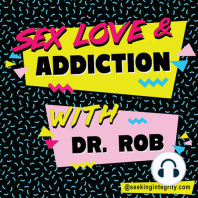39 min listen

Prodependence: Moving Beyond Codependency with Dr. Rob and Tami
Prodependence: Moving Beyond Codependency with Dr. Rob and Tami
ratings:
Length:
36 minutes
Released:
Aug 23, 2018
Format:
Podcast episode
Description
Today on the podcast, Rob and his partner in crime (and healing), Tami explore a new model to treat the betrayed and hurting partners of sexual addicts - Prodependence. Rob has been immersed in the last few years in looking for a new model that moves beyond codependency, and helps to validate and support the partners of addicts, rather than pathologizing and blaming them. His new book, Prodependence: Moving Beyond Codependency, explains this model and the framework of attachment vs. trauma therapy and changes the lens from confrontational to invitational. He and Tami answer questions about the formation of codependency in the 1980’s and how it evolved, the issues with the codependency model, explanation of the “crazy” state of an upset partner, and how Prodependence encourages loving in a manner exhibiting boundaries and self care. TAKEAWAYS: [1:29] Rob’s book, Prodependence: Moving Beyond Codependency, will be out in September. Rob has been very invested in this topic over his many years as a therapist, including his PhD dissertation on codependency. [2:06] Q: Why did Rob write Prodependence? A: For the first ten years that Rob was in practice from 1991 - 2001, partners of sex addicts were treated using codependency, the same model that was used for alcohol and drug addiction. This speaks to not just what is going on with the addict, but assumes that a partner’s distress and anger has to do with their own early life experiences instead of the trauma they feel from the addict’s behavior. Codependency says that we are working out and repeating patterns from unresolved relationships. [3:45] There is an assumption, in the models we have been working with, that the partner is somehow in part responsible for maintaining addiction. [5:21] Prodependence states that every action a partner or loved one takes - enabling, rescuing, even nagging, is acting out of love. It is the nature of relationships where we are attached, and looking out for our primary bond. When our primary bond is threatened, what seems like “crazy” behavior is really just the partner trying to step up and save their family. [6:21] Codependency came out in the 1980’s, and became a big pop culture issue during the rise of feminism. It emphasized that partners look at themselves and take accountability, while prodepenence recognizes the partner is going through a major crisis and must be treated for the trauma happening in that present moment for at least the first 60-90 days. [8:51] When we experience a loss and grieve, we have regrets and remorse as part of the process. It’s natural for partners to blame themselves, rather than realize they have been victimized. There is an emphasis in codependency to look at the partners behavior, and from that, surmise how they enabled the addict’s behavior. [12:37] Prodepenency supports the proven fact that we do better in life, work and social situations when we have a stable relationship and attached bonds. [13:35] In the early stages of treatment, it’s important to acknowledge the partner’s suffering and efforts to keep their family together. [15:35] Q: Do you think that Codependence Treatment as a trauma based model can actually be counterproductive when working with loved ones of addicts? A: The essence of codependency is a trauma based and deficit based model. It says to the partner, you have some problems in the way you love, and pathologizes them to feel wrong and broken for the love they have been trying to show in order to save their family and marriage. Prodependency has empathy for the way they have been trying to love, and supports and teaches them to find a different way. [21:33] When partners come in to seek help, they often have been lied to and had their suspicions doubted over a long period time. It’s not their early trauma that makes them feel “crazy”, it’s the thought of their whole world being a lie, or getting information that takes the bottom out of everything they have believed to b
Released:
Aug 23, 2018
Format:
Podcast episode
Titles in the series (100)
Healthy Dating in Recovery with Jonathon Taylor and Jackie Pack: Jonathon Taylor and Jackie Pack are on a mission to help people know what healthy dating and true intimacy look like. On today’s episode, they join Rob for a talk about their own journey as Licensed Therapists, their great work with One Layer... by Sex, Love, and Addiction